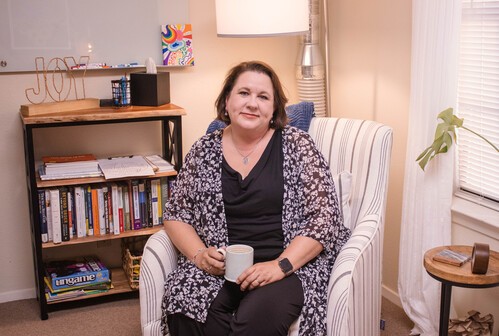Regaining Balance with Self-Reflection

Sometimes life can get so chaotic that it begins to take a toll on us before we recognize what is happening. In this blog, Julie O’Brien, MA, LPC-Associate, Supervised by: Kerry Williamson, MA, LPC-S, LMFT-S, CST shares a helpful framework for evaluating how we are doing in order to make adjustments. Be sure to download the infographic that she created and uses with clients at the end of the post!
Are you feeling down and aren’t sure why? Maybe it’s time for some self-reflection and a little extra care. Self-care and evaluation can help us when we are feeling low or disconnected. When reflecting on your life, try looking at it like a table that has four legs. If a table is off-balance, it is usually because one of the legs is broken or weak. In the same way, you can visualize four key areas of life, physical, mental, relational, and spiritual to determine if one of them is weak and needs some attention. Each of these areas represents a leg of the table. To evaluate the balance of your life, you can ask yourself a variety of probing questions for each of the key areas:
Physically: “Am I physically caring for my body as I should? Am I eating nutritious food, and getting enough water? Am I getting adequate rest? Am I spending time outdoors, exercising, and enjoying God's creation?” God created humankind in a garden, not in an office building lit by fluorescent light and built of metal and concrete. He wants us to spend time outdoors, in the sunshine, where we can find refreshment in nature.
Mentally: “Am I experiencing anxiety? Am I battling with intrusive thoughts or negative self-talk? Am I struggling with depression? Am I feeling overwhelmed with stress?”
Relationally: “Do I feel supported by the important people in my life? Am I isolating? Do I feel tension or conflict with others? Am I carrying resentment towards someone? To whom do I need to make amends or reconnect after a conflict? What are my boundaries and are they healthy?”
Spiritually: “Am I feeling disconnected from God? Do I feel hopeful or despondent about the future? Do I have bitterness, jealousy, or anger that I am hanging on to? Am I struggling with shame over something I’ve done, or something done to me?”
All four of these key areas of life balance are things we can use for our own self-evaluation. We can journal about this, talk it over with someone we trust, and channel some extra time, energy, and resources toward strengthening what is weak.
If you are struggling with depression, anxiety, or negative thoughts about yourself and your future, I encourage you to use this framework as a way to identify what may be putting your life out of balance. You can download a helpful infographic self-evaluation tool I created and use with clients here. If you’d like to process your reflections with someone to decide on next steps, I would be honored to come alongside you in that process. If you are interested in scheduling a session with me or another therapist at ALCS, please contact our office.
Physically: “Am I physically caring for my body as I should? Am I eating nutritious food, and getting enough water? Am I getting adequate rest? Am I spending time outdoors, exercising, and enjoying God's creation?” God created humankind in a garden, not in an office building lit by fluorescent light and built of metal and concrete. He wants us to spend time outdoors, in the sunshine, where we can find refreshment in nature.
Mentally: “Am I experiencing anxiety? Am I battling with intrusive thoughts or negative self-talk? Am I struggling with depression? Am I feeling overwhelmed with stress?”
Relationally: “Do I feel supported by the important people in my life? Am I isolating? Do I feel tension or conflict with others? Am I carrying resentment towards someone? To whom do I need to make amends or reconnect after a conflict? What are my boundaries and are they healthy?”
Spiritually: “Am I feeling disconnected from God? Do I feel hopeful or despondent about the future? Do I have bitterness, jealousy, or anger that I am hanging on to? Am I struggling with shame over something I’ve done, or something done to me?”
All four of these key areas of life balance are things we can use for our own self-evaluation. We can journal about this, talk it over with someone we trust, and channel some extra time, energy, and resources toward strengthening what is weak.
If you are struggling with depression, anxiety, or negative thoughts about yourself and your future, I encourage you to use this framework as a way to identify what may be putting your life out of balance. You can download a helpful infographic self-evaluation tool I created and use with clients here. If you’d like to process your reflections with someone to decide on next steps, I would be honored to come alongside you in that process. If you are interested in scheduling a session with me or another therapist at ALCS, please contact our office.

Julie works with teens and adults struggling with grief, anxiety, depression, autism, trauma, post-traumatic stress disorder (PTSD), self-harm, addiction, suicidal ideation, betrayal, divorce recovery, difficulty bonding, broken relationships, and strained parent / child relationships.
Julie utilizes Cognitive Behavioral Therapy (CBT) and Narrative Therapy to unearth hidden traumas and childhood wounds, and TBRI to address attachment needs and fear-based behaviors.
For specific questions, email Julie at julie@abundantlifecounseling.com.
Julie utilizes Cognitive Behavioral Therapy (CBT) and Narrative Therapy to unearth hidden traumas and childhood wounds, and TBRI to address attachment needs and fear-based behaviors.
For specific questions, email Julie at julie@abundantlifecounseling.com.
Posted in Blogs by Julie
Posted in therapy, understanding feelings, Christian counseling, Christian therapy, counseling
Posted in therapy, understanding feelings, Christian counseling, Christian therapy, counseling
